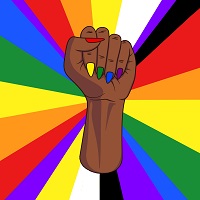“small child sleeping near Clorox, dreaming of soap suds & milk, if no one has told you, you are a beautiful & lovable & black & enough & so—you pretty you—am I” (Danez Smith)
A quick google search about “self-hatred” shows the picture of a Black woman facing down with her arms crossed on her chest. This search appears both as a symptom and a symbol: how to love yourself when society keeps discrediting, fearing, and diminishing you? In the early 2000s, the clothing store Abercrombie & Fitch found itself embroiled in lawsuits for its discriminatory hiring and marketing practices that reinforced whiteness as the industry standard of “cool” as well as clearly defined gender binaries. By the time Barack Obama came into office in 2008, the brand had declined in popularity, while artists of color began to challenge and redefine the concept of masculinity and gender fluidity in the public sphere.
For example, the actor, singer, and model Jaden Smith, in total contradiction with Abercrombie & Fitch's image, appeared with clothing that was considered provocative and nonconforming in both photo shoots for Louis Vuitton and Vogue Korea in 2016. Lil Nas X is another example of an artist, who has explored gender fluidity through his artistry. The music video “Call Me By Your Name” features an internal battle between Lil Nas X and his demons, as he is tempted in the Garden of Eden, brought to trial by the norms of society regarding his sexuality, and ultimately defeats his doubts and embraces his inner self. The singer embodies several characters in the video, which raises questions about the possibilities/modalities of self-love and revolt. The poet Danez Smith, too, reflects upon the same internal strife. In his poem “On faggotness,” he remembers the first time he was called a “faggot,” while spinning in his mother's dress. His grandfather witnessed this and proclaimed “that boy gonna be a. faggot.” This was the moment that Danez Smith, as a child, suddenly “saw [his] body upside down” in his mother's mirror.
Black queer artists continue to explore some of the ambitions, claims, and issues faced by the Black community and the challenging intricacies of their own intersectionality. This communication will examine the journey from self-loathing to self-love in the work of three young Black cisgender male artists and their repudiation of whiteness as the standard of beauty and gender-conforming traditions. We will focus on Lil Nas X's song Call Me By Your Name, Jaden Smith's fashion line that aims to “normalize” gender fluidity for the next generation, and the poet laureate Danez Smith's books, Homie and Don't Call Us Dead, which seek to give a voice to the voiceless.
Corpus:
- Lil Nas X: Montero album (especially the following songs: “Call me by your
name,” “Void,” “Sun Goes Down,” “Industry Baby,” “Holiday,” “Old Town
Road”)
- Jaden Smith: Louis Vuitton and Vogue Korea 2016 campaign, Cabin Fever.
- Danez Smith: 3 collections of poems (Insert Boy, Don't Call Us Dead,
Homie)

 PDF version
PDF version
